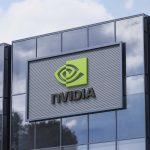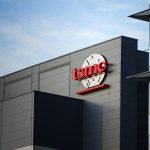
- Earnings
ASML Tops Q2 but Warns on 2026 Growth, Shares Slide
5 minute read

Semiconductor equipment leader ASML faces market skepticism despite record-breaking sales and surging AI chip demand
Key Takeaways
- ASML shares drop 6.5% after the Dutch semiconductor equipment giant warns it cannot confirm growth for 2026, despite beating Q2 expectations with €7.7 billion in net sales
- Q3 revenue guidance falls short with ASML forecasting €7.4-7.9 billion, below market expectations of €8.3 billion, signaling potential demand slowdown
- Net bookings surge to €5.5 billion exceeding expectations of €4.19 billion, driven by €2.3 billion from critical EUV systems amid strong AI chip demand
Introduction
ASML faces investor uncertainty despite delivering strong second-quarter results that exceeded expectations across key metrics. The Dutch semiconductor equipment manufacturer reported net sales of €7.7 billion and net profit of €2.29 billion, both surpassing analyst forecasts.
The market’s negative response centers on ASML’s cautious outlook for 2026, reflecting broader concerns about semiconductor demand cycles and geopolitical pressures. According to CNBC, the company’s dominant position in lithography equipment makes its forward guidance a critical indicator for the entire chip industry.
ASML controls 66.44% of the industrial machinery and components sector, with its Extreme Ultraviolet systems essential for producing next-generation processors that power AI applications and consumer electronics.
Key Developments
ASML’s second-quarter performance demonstrated resilience in core business metrics. Net bookings reached €5.5 billion, significantly above the expected €4.19 billion, with EUV systems contributing €2.3 billion to the total.
The company maintained its 2025 growth forecast at 15% but narrowed its guidance range, signaling increased visibility into near-term demand patterns. Research and development investment continues at elevated levels, with €1.14 billion allocated in the first quarter alone.
ASML achieved a significant milestone by shipping its first High NA EUV tool during the quarter. These advanced systems, priced above $400 million each, represent the next generation of lithography technology crucial for cutting-edge chip manufacturing.
The third-quarter revenue guidance of €7.4-7.9 billion falls short of market expectations, creating uncertainty about momentum heading into 2025’s final months.
Market Impact
ASML shares declined 6.5% following the earnings announcement, with investors focusing on the company’s inability to provide 2026 growth confirmation. The stock movement reflects heightened sensitivity to forward-looking statements from semiconductor equipment suppliers.
The broader semiconductor sector experiences volatility as investors assess demand patterns for AI-related chips and consumer electronics. ASML’s cautious guidance contributes to concerns about potential overcapacity after several years of rapid industry expansion.
Market analysts note that ASML’s revenue visibility typically extends 12-18 months, making the 2026 uncertainty particularly significant for investment decisions. The company’s essential role in the semiconductor value chain amplifies the impact of its guidance on sector sentiment.
Strategic Insights
ASML’s technological leadership in EUV lithography creates a substantial competitive moat, with no direct competitors offering comparable capabilities for advanced chip manufacturing. The company’s High NA EUV systems enable further miniaturization and efficiency improvements that semiconductor manufacturers require.
The semiconductor market’s projected growth to exceed $1 trillion by 2030 supports long-term demand for ASML’s equipment. AI adoption and high-performance computing applications drive requirements for cutting-edge chips that depend on ASML’s lithography tools.
However, the cyclical nature of semiconductor capital expenditures creates periodic demand fluctuations. Manufacturers’ investment timing depends on end-market conditions, inventory levels, and macroeconomic factors that influence purchasing decisions.
ASML’s continued R&D investment positions the company for next-generation technology transitions, but near-term revenue depends on customers’ capacity expansion plans and upgrade cycles.
Expert Opinions and Data
CEO Christophe Fouquet acknowledges the challenging outlook while emphasizing underlying strength in key market segments. “Looking at 2026, we see that our AI customers’ fundamentals remain strong,” Fouquet stated. “However, increased uncertainty makes it difficult to confirm growth at this stage.”
CFO Roger Dassen attributed the quarterly beat to upgrade revenue and reduced tariff impact, highlighting operational factors that supported performance. The management team emphasizes ASML’s essential role in enabling Moore’s Law continuation through advanced lithography capabilities.
Industry observers maintain positive long-term perspectives based on secular growth drivers in AI, data centers, and automotive applications. The semiconductor market’s annual growth rate of approximately 9% from 2020 to 2030 supports sustained demand for advanced manufacturing equipment.
Analysts focus on ASML’s technological differentiation and market position as competitive advantages that support pricing power and market share retention across business cycles.
Conclusion
ASML demonstrates strong operational performance while navigating uncertainty about future demand patterns. The company’s second-quarter results confirm its market-leading position and technological capabilities, but forward-looking challenges create investor caution.
The semiconductor equipment market faces cyclical pressures that affect capital expenditure timing and magnitude. ASML’s ability to maintain growth depends on customer investment decisions and end-market demand for advanced chips, particularly in AI and high-performance computing applications.








